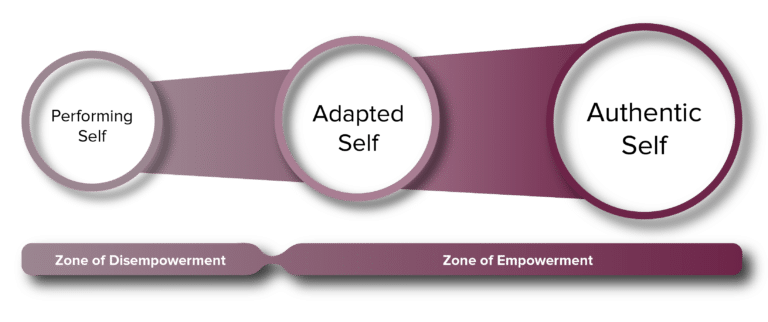Spotlighting the Magic of The Three Selves Framework™

In this blog, I want to spotlight my Three Selves Framework™ – a model for living, working, and leading more authentically AND for cultivating greater belonging in the workplace.
I dig into this powerful tool in both my bestselling books The Authenticity Principle and We’ve Got This – and trust me when I say it’s a game-changer!
My Three Selves™ approach offers a more practical way of understanding authentic behavior. It highlights that rather than being either “authentic” or “inauthentic,” each of us has the following three selves: the Authentic Self, the Adapted Self, and the Performing Self.
Your Authentic Self is who you are at your core – a reflection of your values, beliefs, needs, desires, thoughts, emotions, and traits. It’s how you would behave if you didn’t fear the consequences of your behavior. Your Authentic Self is the truest reflection of who you are and, given this, being your Authentic Self feels amazing, which is why it’s in the Zone of Empowerment. As a leader, you want to manage, lead, and coach in such a way that encourages your team members to bring as much of their authentic selves to work – so that they can experience greater belonging. And you also want to ensure that you’re not pushing your authenticity on others.
No one can be their Authentic Self 100% of the time, and this is where the Adapted Self comes in. Your Adapted Self is who you are when you make a choice to adjust your behavior to meet your own needs and others’ needs. When you show up as your Adapted Self, you choose to do this, it feels good, it serves you and others, and it’s still a reflection of your authenticity. This is why it’s still in the Zone of Empowerment. As a leader, you want to suggest behavioral adaptations to your team members to help guide them to meet performance expectations, but also recognize that your team members get to decide when and how they adapt. This is what creating cultures of belonging is all about.
Your Performing Self is who you show up as when you feel you don’t have a choice but to conform, change, or hide aspects of your identities – as a reaction to the judgments coming your way. It’s like you’re an actor on a stage – you’re “performing you” rather than being you. Your Performing Self feels upsetting and exhausting, which is why it’s in the Zone of Disempowerment. As a leader, first, you want to push out of performing yourself, since you too want to experience belonging at work. Second, you want to ensure that you’re not pushing your team members to conform or to mask who they are to get ahead. Recall that “performing” who you are versus being who you are strikes at your ability to belong.
In leveraging the Three Selves™ here’s a few important things to remember:
- To experience the greatest depth of belonging, you want to show up as your Authentic Self (the good side of your Authentic Self, letting go of the bad and ugly sides) as much as possible
- But no one can be their Authentic Self 100% of the time, and this is where the Adapted Self comes in. You can, and sometimes need to, choose to show up as your Adapted Self, especially in moments where being your Authentic Self doesn’t feel safe, serve you, or you just don’t want to
- Finally, you’ll want to push out of being your Performing Self, where you change or mask who you are because of hateful and hurtful messages coming your way – as it strikes at your belonging
I’ll dig deeper into the Three Selves Framework™ in our upcoming blogs. But if you want to learn more now, head to my empowerment site and download my Empower Pages to snag your free worksheets on each of the Three Selves™. And of course, you’ll want to check out both my books – The Authenticity Principle and We’ve Got This.
Finally, if you’re struggling to unlock authenticity and belonging at work for yourself or for others, know that you can use the Three Selves Framework™ to keep you on track. It’ll literally change your world.
Try it out and let me know how it goes!
Reach out to the bci team here to learn more about our range of cutting-edge programming on how to cultivate authenticity and belonging in the workplace.
If you’re looking for more authenticity and belonging related resources, checkout:
- bci’s dedicated playlist: Claiming and Creating Belonging
- bci’s tip sheet: Cultivating Belonging in the Workplace
- Article: Authenticity: The Transformative Approach to Building Inclusive Environments
- My blog page: Belong to Yourself
- My Belonging Toolkit

